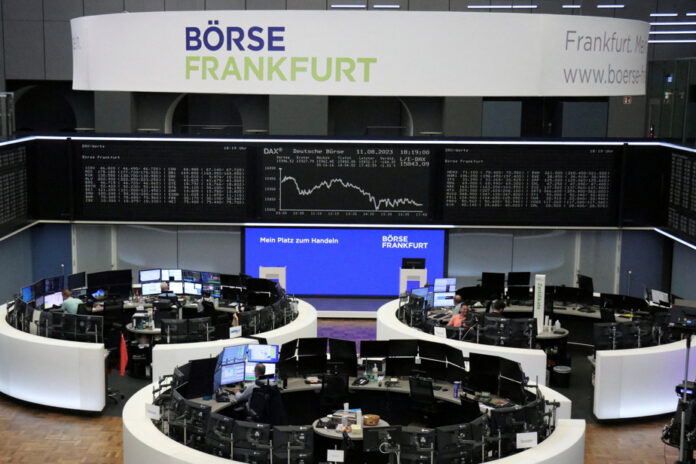(Paris) World stock markets fell again on Wednesday, fearing that the weakness of economic activity in the world in recent months is added to the rise or persistence of inflation via commodity prices.
Wall Street opened lower: the Dow Jones fell 0.58% around 11:50 a.m. EST, the S
In Europe, the Paris Stock Exchange fell 0.84% at the close, weighed down by luxury, Frankfurt fell by 0.19% and London by 0.16%. Milan lost 1.54%, heckled by its banks.
“The markets are in the process of integrating the risk where stagflation”, that is to say a situation where inflation is high, but growth is low, “would be the marker of the economy”, describes Michael Nizard , director of multi-asset investments at Edmond de Rothschild AM.
“The eye of the storm” is, according to him, “the price of raw materials”, in particular oil: after having increased all summer, prices were further supported by the announcements on Tuesday of the extension of the cuts made by Russia and the ‘Saudi Arabia.
Around 11:30 a.m. (Eastern Time), a barrel of North Sea Brent for delivery in November was stable at $90.02, and a barrel of American West Texas Intermediate (WTI), with delivery in October, advanced 0.17% to $86.84.
This rise in oil prices raises fears of a resumption of inflation, or a slower decline than expected, particularly in Europe. This scenario has repercussions on “long rates”, which have risen, but also on the strength of the dollar for several weeks as well as on the stock markets, describes the manager.
A resurgence of inflation would encourage central banks to maintain their restrictive monetary policy, implemented since 2022, for many more months.
Even the good performance of the manufacturing sector in the United States according to the ISM indicator does not bring comfort to investors. “It raises concerns about persistent inflation” in particular, as the ISM index of prices paid came out well above expectations, says Christophe Boucher, chief investment officer of ABN AMRO IS.
State interest rates were rising again: the interest rate on the US 10-year bond rose to 4.29% around 11:40 a.m. (Eastern time), against 4.26% on Tuesday, and that of Germany rose to 2.66% against 2.61% on Tuesday.
Faced with these pessimistic visions over the next few months, the jump could paradoxically come from the lack of dynamism in China, which “could export the slowdown in its demand”, particularly in raw materials and thus lower oil prices, nuance Mr. Nizard .
Apple fell back (-2.97%) after a Wall Street Journal report that the Chinese government ordered state agencies and their employees to stop using iPhones. Asked by AFP, Apple did not react immediately.
Among the large-cap tech companies, Nvidia was subject to profit taking (-3.41%), two weeks after an all-time high following still-sparkling results.
The world’s largest luxury goods company LVMH fell 3.64% in Paris, with its share price falling to its lowest level since January. The whole luxury sector is suffering with the statements of the owner of Richemont (-5.18%) Johann Rupert during the General Meeting of the company, stressing that inflation is affecting the demand for luxury goods in Europe, Bloomberg reported.
LVMH, which lost its rank of first European capitalization last week, is also affected by an HSBC rating, which maintained its recommendation, but sharply lowered its price target.
Shares of Kering (-2.31%) and Hermès (-1.86%) were also downgraded by the bank, but more slightly. Elsewhere, Burberry yielded 4.71%, Swatch 2.72%.
The US dollar was stabilizing against the euro after gains the day before. The euro was down 0.07% at $1.0714 around 11:40 a.m. EST.
Bitcoin fell 0.34% to $25,620.















